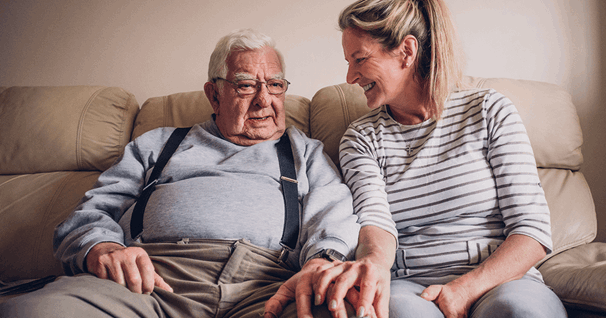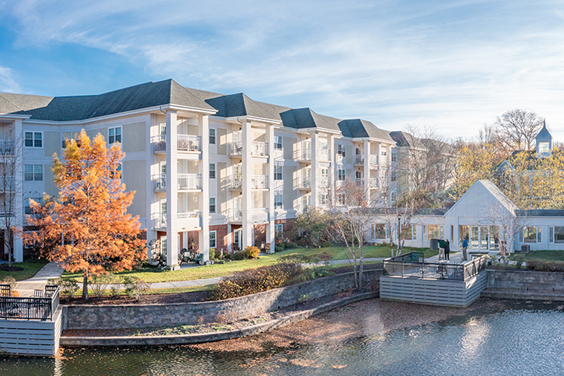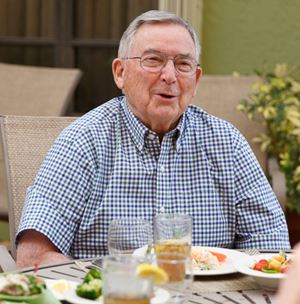When Aging Parents Can’t Live Alone at Home Anymore

Your parents were there for you from the beginning, through your teenage years, and may still remain an incredible source of support, wisdom, and advice well into your adulthood. It’s only natural, then, that as your parents begin to age, you’re there for them in many of the same ways they were always there for you.
Making sure elderly parents are safe and healthy isn’t always an easy job. You’ve got your own life to live, and that can include things like work and raising your own children. As much as you want to be there whenever you can, there are limits, and sometimes we have to be honest with ourselves about those limits, and kind in our forgiveness of our limits.
You may feel a lot of anxiety if your aging parents seem to be having trouble with everyday tasks. But are you seeing signs that your elderly parents can’t live alone? And if you are, what next?
Here is some information to help you through this difficult time.
How to Know When an Elderly Person Can’t Live Alone
It’s no surprise that we’re able to do less for ourselves as we age. Even the heartiest and healthiest elderly parent can face some challenges when it comes to getting around on an everyday basis. The problem, however, arises when age-related changes to a parent’s mind and body make simple tasks so challenging that you have fears they might hurt themselves without someone there to help.
Being certain on how to know when your aging parent or an elderly person can’t live at home anymore can be hard to judge. Everyone is different, and where one elderly parent might be able to handle certain tasks, another might find them quite challenging or even impossible without help. The following signs might help you determine if your elderly parent can’t live alone anymore.
Growing Frequency of Falls
Everyone takes a tumble now and again. However, in the elderly, an increasing number of falls could indicate growing age-related physical weakness. This could pose a great danger to older people; the bumps and bruises that a younger person might suffer from a fall could be quite serious or even fatal in an older one. A major warning sign that your elderly parent can’t live alone is if they seem to be falling more often or exhibiting more unsteadiness than usual.
One possible solution is to make fall prevention upgrades in the home, such as installed a handle bar in the shower. But be aware that at some point, the fall risk may be so acute that even a bar is not enough protection. And is the home setup such that, as another example, all living needs could occur on the first floor and your parent never needs to worry about navigating stairs again?
Trouble Completing Tasks
The tasks we all must do daily might be tedious, but they’re usually not challenging. Things like taking out the trash, doing the dishes, washing and drying laundry, or going grocery shopping are all necessary to the day-to-day operation of a household. We might be a little tired after a full day of doing errands, but an elderly parent who becomes so fatigued that they can’t complete but one or two of these necessary tasks could indicate that they’re in need of more organized and regular help.
Services like grocery delivery is making this a little easier, as long as your parent can still carry the groceries from the door to the kitchen, or put away the groceries if brought to the kitchen. But at what point does it get too difficult for them to routinely dust and vacuum, for example? Or even remember which groceries to order, which brings us to…
Increased Confusion
Everyone has moments of confusion from time to time. It’s only natural to have something slip your mind or have a momentary gap in comprehension. The signs to look for are larger cognitive or memory declines than that.
If your elderly parent seems to have trouble grasping certain concepts that they used to or if their memory seems to be impaired, this could indicate that they could need some additional help. Forgetting the order groceries is an example. One of the more telling signs, the issue that is a frequent indicator that elderly parents can’t live alone, is forgetting to take their medication, or forgetting if they took their medication and so taking it again. Adult children often try to help by buying day of the week pill boxes and setting reminders on their parents’ phone, but this is the type of situation to be extra vigilant for, because it is likely an indicator of larger issues that prevent the parent from being able to function safely on their own.
Options for Elderly Parents Who Can’t Live Alone

Elderly parents exhibiting any of the above issues may be in need of extra help. This can be frustrating in situations where you’re unable to provide that help yourself, no matter how badly you want to be able to.
Home Health Aide
The first line of defense is often a home health aide. This type of service has a professional visit the home to tend to chores and other needs. They can even help with acts of daily living like bathing and eating.
You may want to start with certain hours in the day, though you may find yourself worrying extra during those times of the day or night when there is no home aide on duty. When that happens, you may opt for a 24-hour service, to ensure someone is always home with your loved one.
In many cases, your parent may prefer this, because it allows them to remain in their home.
But please keep in mind that your top priority must always be their safety and care. And there may come a time, or there may be certain situations, where the home itself is simply unfit for your aging parent. Even if an aide is there 24 hours a day, stairs or bathtubs or other scenarios can pose risks.
Assisted Living Facility
In the event that it’s unsafe for an aging parent to live alone in their home, consider an assisted living facility.
Far from the image you may have in your mind of an “old folks’ home,” modern assisted living campuses are luxurious, well-appointment, comfortable living environments. They are not all that drastically different from a nice retirement community apartment, except that they are built with safety protocols in mind, and have nursing staff 24-7.
Assisted living facilities ensure families that their loved one’s healthcare needs will always be met, thanks to trained and experienced staff members available around the clock for not just emergencies but everyday needs and daily living. This way, you can rest assured that you won’t have to wonder what to do when your parent can’t live alone and needs to be taken care of — you’ll know that they are safe, comfortable, and likely making wonderful new friends. You can stop worrying that you aren’t always there or don’t always have someone there, ready to protect and help.
How Acts Can Help

As one of the largest networks of retirement communities in the United States, Acts Retirement-Life Communities can provide your elderly parents with a safe and comfortable place for them to enjoy and feel secure.
With 27 well-appointed campuses across eight states offering advanced levels of healthcare, Acts has the resources and staff necessary to provide assisted living care to an elderly parent who needs a little extra help. You’ll be able to rest easy, knowing that even though your parent can’t live alone, someone will be there and know what to do when they may need assistance.
After all, just because you can’t be there 24/7 for your parents doesn’t mean don’t love them any less. They raised you and helped you get where you are today. It’s time to return the favor by ensuring they are in happy, comfortable, safe surroundings.
Learn more about Acts’s exceptional assisted living options.





